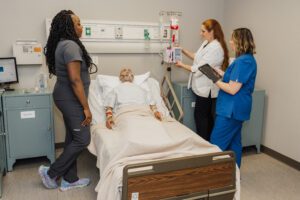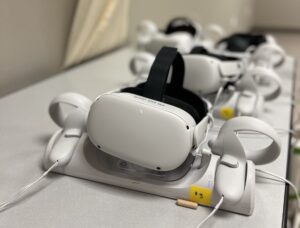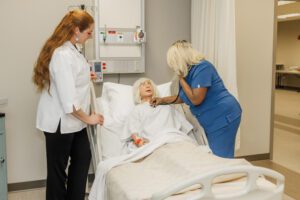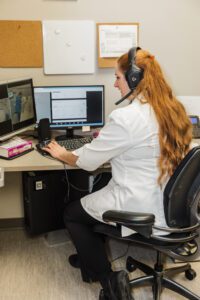Embracing the Power of Simulation: Enhancing Nursing Education for Real-World Impact
Posted on August 14, 2023

The faculty members at Bolivar Technical College (BTC) have graciously provided some valuable insights into the world of nursing simulation, shedding light on how this innovative teaching method is revolutionizing nursing education and training. In this comprehensive blog post, we’ll delve into the depth and significance of simulation, debunking misconceptions, and showcasing how it enriches nursing education to better prepare students for real-world scenarios.
Immersive Realism in a Safe Environment
At BTC, simulation is not merely a role-playing exercise; it is an immersive and authentic experience for nursing students. Lucinda Schmidt, Coordinator for Simulation and Skills, passionately emphasizes that students encounter scenarios that closely mirror real-life clinical situations. The patient mannequins, like ALEX, are advanced Artificial Intelligence (AI) models that respond realistically to care and treatment. Whether it’s checking vital signs, assessing symptoms, or administering medications, students face identical challenges they will encounter in actual clinical settings.
But what truly makes simulation valuable is the safety net it provides. In this controlled environment, students can learn, make mistakes, and refine their skills without putting real patients at risk. This safe learning environment fosters a mindset of continuous improvement, allowing students to build confidence and competence in their nursing practice. By removing the fear of harming patients, simulation empowers students to explore, experiment, and grow without constraints, paving the way for future success in their nursing careers.
Cutting-Edge Technology for Comprehensive Learning
Bolivar Technical College remains at the forefront of nursing education by wholeheartedly embracing cutting-edge technology in simulation training. Erin Mock, Director of Nursing Education, excitedly highlights the utilization of high-fidelity mannequins and sophisticated recording systems. These advancements allow faculty members to closely monitor student performance, offer personalized feedback, and identify areas that need improvement. With real-time data and analytics, instructors can assess students’ decision-making abilities, communication skills, and critical thinking during simulations, leading to more targeted and effective learning experiences.
 Moreover, the recent addition of Virtual Reality (VR) simulations takes nursing education to a new level. By immersing students in realistic clinical scenarios through VR equipment, this technology offers a unique perspective that traditional methods cannot replicate. For instance, students may face emergency situations where they have to stabilize a critically ill patient before transferring them to the ICU or calling a code blue. These interactive VR simulations challenge students to think on their feet, make split-second decisions, and manage the stress of high-pressure scenarios, all in a risk-free setting.
Moreover, the recent addition of Virtual Reality (VR) simulations takes nursing education to a new level. By immersing students in realistic clinical scenarios through VR equipment, this technology offers a unique perspective that traditional methods cannot replicate. For instance, students may face emergency situations where they have to stabilize a critically ill patient before transferring them to the ICU or calling a code blue. These interactive VR simulations challenge students to think on their feet, make split-second decisions, and manage the stress of high-pressure scenarios, all in a risk-free setting.
Diverse Simulations Tailored to Nursing Programs
One of the hallmarks of Bolivar Technical College’s nursing program is its wide range of simulations, each carefully designed to align with the students’ learning objectives. Schmidt provides a glimpse into the powerful array of simulation topics across the Practical Nursing (LPN) and Professional Nursing (RN) programs:
Practical Nursing: Hypertension, Pediatric care, Respiratory conditions, Gastrointestinal (GI) & Genitourinary (GU) Allergies and Inflammation, Maternal (OB), and Cardiac scenarios.
Professional Nursing (RN): Blood Administration, Respiratory complexities, Hypertension, Stroke management, Pediatrics, Maternal (OB) complications, Leadership challenges, Cardiac emergencies, GI & GU care, Septic Shock scenarios, and Allergies and Inflammation cases.

By offering diverse simulations, the faculty ensures that students experience a comprehensive range of medical situations, preparing them to adapt and thrive in various nursing specializations and healthcare settings. These simulations are meticulously designed to align with the curriculum, reinforcing the theoretical knowledge students acquire in lectures and skill labs. When students apply this knowledge in simulation scenarios, they gain a deeper understanding of the complexities of patient care and how to apply evidence-based practices in real clinical settings.
Immersive Learning Frequency
BTC acknowledges the immense value of immersive learning and Bailee Bailey, RN Program Coordinator, explains how the college incorporates simulation frequently into its nursing programs. Students participate in simulation lab experiences every other week or even weekly, starting as early as the second semester for Practical Nursing (LPN) students and the third semester for Professional Nursing (RN) students.
This regular exposure to simulations ensures a continuous honing of clinical skills, critical thinking, and teamwork, allowing students to transition seamlessly from classroom theory to real clinical practice. Frequent engagement with simulations keeps students engaged and reinforces their learning, fostering a deep connection between theoretical knowledge and practical application. As they encounter diverse and challenging scenarios, students become more adaptable, resourceful, and confident in their abilities, laying a solid foundation for their future nursing careers.
Effective Evaluation and Reflection 
Simulation at BTC is not just about going through the motions; it involves a well-structured evaluation and debriefing process. During simulations, students are assigned specific objectives to complete, which are carefully crafted to assess their competency in various nursing skills. Faculty members evaluate students based on their patient care, communication, assessment, critical thinking, and adherence to safety protocols. These evaluations provide valuable feedback to students, highlighting areas of excellence and areas that may require further improvement.
Following each simulation, students engage in meaningful debriefing sessions with their instructors. These sessions provide a platform for students to reflect on their experiences, discuss their thought processes, and receive constructive feedback from their instructors and peers. Through this process, students gain insights into their strengths and areas for improvement, nurturing well-rounded and competent nurses.
In Conclusion
Simulation stands as a cornerstone of Bolivar Technical College’s nursing education, bridging the gap between theory and practice in a safe way. By immersing students in realistic scenarios, providing cutting-edge technology, and offering a diverse range of simulations, the college prepares nursing students to excel in their future careers as healthcare professionals.
Simulation is a transformative tool that empowers students to become compassionate, skilled, and confident nurses. BTC’s dedication to simulation-based learning ensures that their nursing graduates are equipped with the knowledge and experience to make a real-world impact in the ever-evolving field of healthcare.
As the nursing profession continues to evolve, simulation will remain a driving force in shaping the future of nursing education, empowering the next generation of nurses to provide exceptional care and positively impact the lives of patients they serve. The commitment of Bolivar Technical College to innovative and immersive learning experiences ensures that its nursing graduates emerge as competent, empathetic, and proficient caregivers, well-prepared to navigate the complexities of modern healthcare settings. With simulation as a vital part of their educational journey, Bolivar Technical College graduates are destined to become leaders and change-makers in the nursing profession, making a lasting difference in the lives of countless individuals they touch with their unwavering dedication to patient-centered care.
Bolivar Technical College is now enrolling students for the Professional Nursing (RN) program, online RN to BSN Completion program, Practical Nursing (LPN) program, LPN to RN Bridge program, and Paramedic to RN Bridge program. If interested in any of the upcoming programs or a tour, contact the college via phone (417-777-5062), email (info@bolivarcollege.edu), or text message (417-771-3543).
